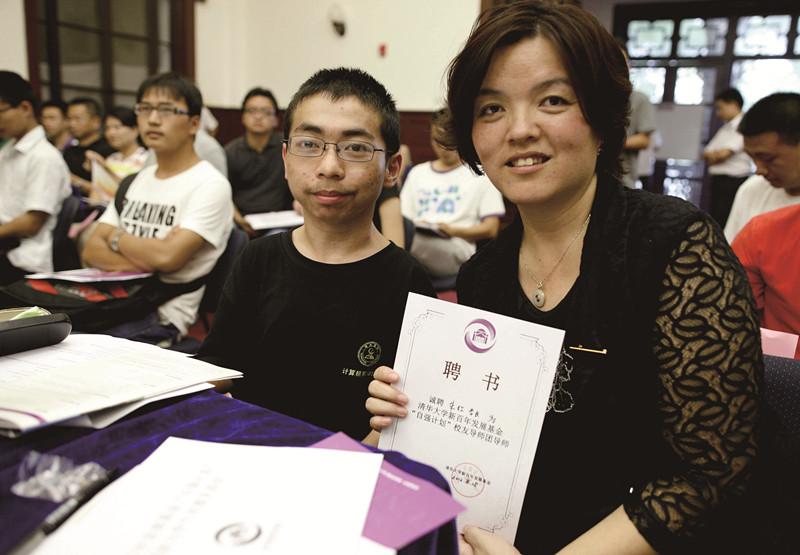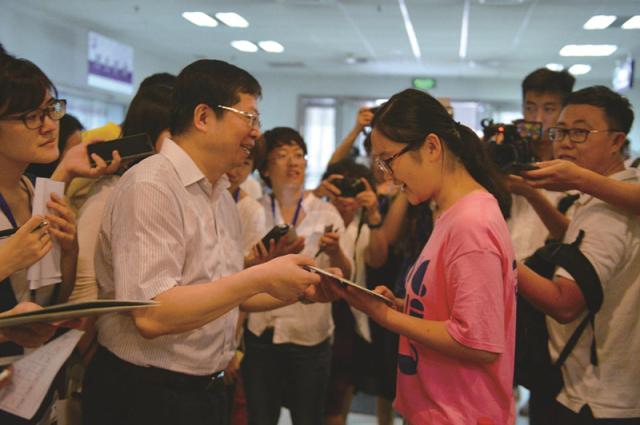
 Old Version
Old Version
Rural Students
“My hometown has two specialties: education and apples,” Han Chuyin, a high school student, told the examiners questioning him about his home county in the mountains of Gansu Province in China’s underdeveloped northwest. The interview at Tsinghua University in 2015 would decide whether he could realize his dream of being admitted to one of China’s most prestigious universities that summer.
A few months later, he heard his name spoken by Tsinghua’s president Qiu Yong at the welcome ceremony for more than 3,300 freshmen on August 20, 2015. In his speech Qiu praised the young man for working toward his goal of attending Tsinghua through bumpy roads and freezing cold boarding schools in the mountains. “The president’s open praise was a big, big happy surprise for me,” he told NewsChina, shyly excited.
Once at Tsinghua, the road was not easy, either. He struggled to catch up with other students, from doing algebra homework and PowerPoint presentations to making speeches and organizing activities. “Sometimes I even asked myself, ‘How can they be so brilliant?’” he recalled, talking of the depression he suffered in his early days at Tsinghua.
Han did not give up. He has rebuilt his academic confidence and is working on helping China’s rural poor. Now he is looking beyond Beijing at the wider world. As a member of a college students’ delegation from the Chinese mainland, he heads out on a visit to Japan, Hong Kong, Macao and Taiwan in the next few months.
Han’s story is typical of the more than 300 poor students who have been accepted by Tsinghua through a special enrollment policy since 2011. They were awarded extra marks on the gaokao (the national university entrance examination) in recognition of their hardship. As Han explained to his Tsinghua interviewers, his fellow villagers regarded a good education as a life-changing opportunity. The special enrollment policy adopted by some top universities in the past few years has made this possible for poor students like Han. However, for numerous poor students in China, the road to good colleges remains hard, and has grown even harder in recent years.
And the lucky ones also have to go through a tough time during and even after college.
A typical Tsinghua student is “born in a city to parents who are civil servants or teachers, travels with parents at least once a year, or has at least one study tour abroad during high school,” Jin Jun, Tsinghua associate professor for sociology, concluded in a survey in 2010. Some of them have the opportunity of joining Tsinghua’s Plan A, initiated in 2011, for future leaders.
Candidates of Tsinghua’s Self-enhancement Project, also initiated in 2011 as a Plan B for poor students, provide a sharp contrast. Between 2012 and 2014, Peng Ling, a Tsinghua enrollment official in Chongqing municipality in China’s southwest, conducted field investigations with her colleagues to assess the academic record, family financial background and perseverance of local candidates. For example, neither Zhang Huafeng, one of the most qualified students, nor his teachers, knew about the investigation until Peng’s team arrived at Zhang’s school. As Peng told NewsChina, this was to avoid fraud. After visiting Zhang’s elementary and middle schools, they went to his home.
They were shocked and moved by what they saw there. In the deep mountain with a muddy road linking it with the outside world, there was a clay house with the wind blowing through empty windows. “The two kids of the family [Zhang and his younger brother, a junior high school student] sat on tree stumps and used a bench as a desk when they studied,” Peng recalled. Zhang was awarded the highest possible bonus marks for hardship, and was admitted to the physics department at Tsinghua. He was the first Tsinghua student from his hometown in six decades.
Like Han, Wang Chao, the best student in the high school in his county in Hunan Province in central China, had to ask for help from his teachers and other fellow students with computers to type and submit their application documents to Tsinghua. They did not have a computer or know how to use one.
The interviews were very difficult for them due to their limited understanding of the outside world. Peng Ling was impressed by the glittering resumes, self-confident behavior and vivid descriptions of overseas experiences of candidates in Tsinghua’s Plan A project for top students. By contrast, candidates for Plan B often stumbled in interviews. “They just repeated the introduction that had been prepared with the help of their high school teachers; then they could hardly respond to further questions,” Peng told NewsChina. A girl once told interviewers that students in her high school never read newspapers, listen to news on the radio or watch TV.
Successful candidates feel under great pressure as soon as they start at Tsinghua. Sometimes Wang Chao struggled with ideas that his fellow students had already learned in middle school.
The Tsinghua student center conducted a survey in the engineering physics department where the share of poor students was high. The results showed that nearly 3 in 5 of the poor students found it hard to keep up with the curriculum, double the percentage of other students, and half suffered from low self-esteem, compared with 1 in 5 of other students.

Qiu Yong, president of Tsinghua University, talks with a new student at the university, August 19, 2015